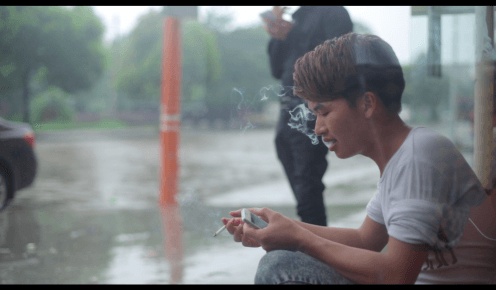From Facebook to ‘fakebook’ – who controls the information on social media?
By Xin Yuan Wang, on 24 November 2016

A young Chinese factory worker reading on his smartphone.
Mark Zuckerberg finally said that Facebook plans to have a more effective control of misinformation, which is a sharp reversal in tone from the comment he made immediately after the US election that the “the idea that fake news on Facebook…influenced the election in any way is a pretty crazy idea.” The fake news that circulated widely on Facebook is believed to have influenced the US election. It is reported that some fake news was created by teenagers in Macedonia who cashed in by catering fake news to demand, and many more were posted by ‘alt-right’ people who cooked up stories on platforms such as 8chan, 4chan, and social media.
The story of how fake news circulated on Facebook reminds me of what I have witnessed about the information consumption on social media among Chinese factory workers during my 15 months of field work in a small factory town in southeast China. Certainly, in many ways the two cases are incomparable, whereas the pattern of information dissemination seems to bear certain similarities.
For Chinese factory workers whose average education level is below middle school (most of them dropped out of school before the age of 17), social media has become the most important, if not the only, information resource. Therefore, social media actually plays an extremely important role in those less-educated people’s communication and (informal) education. What are the consequences of people being dependent on social media as their major information resource? Well, first of all, there will be a higher chance that the information people get will become unbalanced. For people who simultaneously consume news from other traditional media with ‘gatekeepers’, such as TV, newspapers, and magazines, social media is only one of the tools to get news. Therefore, even if there are fake news stories on social media, the reliability of that news will be constantly tested in a more rounded information environment and any possible hazard of fake news will be diluted in a more balanced ‘informational ecology’ – just like natural purification. However, if social media has become the only or the major information resource, the risk of fake news can be amplified. Generally speaking, the higher education people receive, the lower the chance that social media will become their only or major information resource.
To add another layer to the problem. Unlike traditional media where information is distributed in a relatively neutral way, information on social media is not only filtered by customised algorithms based on users’ personal information, but is also filtered by people’s personal social network online – that is to say, each social media contact is a potential news agent who feeds you news on a daily basis. To give an example, as written in the book Social Media in Industrial China based on my research, a comparison of the shared postings on 145 social media profiles of factory workers and 55 profiles of middle-class Chinese in Shanghai shows that there is almost no information flow between two different social groups. Over a period of four months only one out of 6,000 articles (0.03 per cent) was found to have been shared in both groups, though 5.1 per cent of articles were shared within the factory workers group and 1.6 per cent within the Shanghai group. In the case of factory workers, the possibility of the same information being shared within the social group with similar social-economic status is 170 times higher than the possibility of it being shared across groups with different socio-economic statuses.
Also, the amount of fake news I encountered on factory workers’ social media profiles was much more than that on the profiles of middle-class Chinese. Most of the fake news were sensational and dramatic stories about conspiracy, romance, or crime. Even though a few factory workers commented that they could imagine that there were certain ‘untruth’ elements in those news items, most people who shared the news believed the news was based on true stories and those who were not 100% sure certainly enjoyed the reading – as a kind of entertainment. “I would say there must be some truth in it (fake news) otherwise there won’t be so many people sharing it, right? Well, at least I feel for the story, that matters,” a 25-year-old male factory worker told me.
So while there is now the debate about how a social media company can take responsibility to control fake news on social media, for all intents and purposes one also has to acknowledge that in many cases, the most powerful information control comes from people’s sociality – on social media there is a certain truism: ‘who you know may decide what you know’. Among like-minded friends, on social media one receives news that is in most cases only confirming the beliefs shared by the social group one belongs to.
 Close
Close




